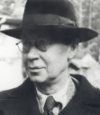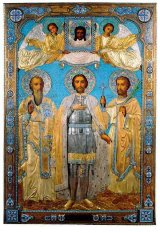
Sergei Prokofiev
PROPAGANDA - (n) - A campaign of dissemination of mass communication designed to influence the minds and emotions of a society for a specific purpose, whether military, political or economic.
It would be nice if music was pure and innocent. Art for art's sake, and all that. But it is rarely the case.
Today, Prokofiev's cantata
Alexander Nevsky is listened to as a large-scale concert work for orchestra and chorus, based on historical events, no doubt, but of no relation to the modern world.
If fact, it was part of a very important political tool in 1938.
Alexander Nevsky was a movie made by the famous Russian director Sergei Eisenstein, the score composed by Prokofiev, and released in that year, the world on the brink of war.

Alexander Nevsky (center)
The movie tells the story of Alexander, a thirteenth century prince of Novgorod. Prince Alexander became a national hero when he led an army that defeated the invading Swedes in 1240 at the river Neve (hence his name).
Two years later the kingdom is threatened by a band of Teutonic knights. Some of the Russian leaders think that signing a peace agreement with the invaders is their best option, but they are outvoted and called traitors and cowards. Alexander forms an army and defeats the knights by luring them out onto a frozen lake. In this famous “Battle on the Ice” the enemy is defeated, their heavy horses and armour too heavy for the ice, which cracks, sending them to a watery grave.
The parallels with modern history were obvious to Stalin; the motherland threatened by German invaders, their home, religion and culture at stake. There was even the talk of a treaty with the Germans. Stalin fully supported the movie as propaganda, to draw the Russians together inspite of almost impossible odds.
Then, all of a sudden, Stalin
did sign a non-aggression pact with Germany, and
Alexander Nevsky the movie became forbidden and forgotten, especially within Russia. It was only when Germany invaded Russia despite the treaty that the movie could be shown again, and it became a rallying cry within the USSR.
As a piece of cinema,
Alexander Nevsky was groundbreaking. The climactic Battle on the Ice, which takes up half of the movie, is spectacularly staged, and its scenes often immitated in movies since.
The score by Prokofiev has been called the greatest movie score ever written. It is so intertwined with the movie that it is impossible to imagine the movie without it. Many parts of it have been incorporated into movie scores since, most notably the theme from Jaws.
During the time when
Nevsky was a forbidden movie, Prokofiev took it and fashioned a concert cantata. While several themes, and the repetitive sequences were ignored, the most important music found its way into the new work, and it is this version that is most commonly recorded today.
The six movements are rich in Russian folk melodies, the sorrow of the battlefield, the patriotic fervour of the people. The highlight, as in the movie, is the Battle on the Ice, which starts out quietly, ominously and slowly builds to a frenzy depicting the madness of war.
Abbado's recording is generally regarded as the best ever. Passionate, lyrical, triumphant. Be warned that this recording will test your speakers to their limits, and maybe beyond.
For those interested, the DVD of the movie, with a fully restored soundtrack can be bought from Amazon
here.
For those who are after the original film score (not the reworked cantata) and freshly recorded, you can get it
here.
Please support Good-Music-Guide.com
by purchasing this CD using this link.

Track Listing
Sergei Prokofiev
Alexander Nevsky cantata
Leutenant Kije Suite
Scythian Suite
London Symphony Orchestra
Claudio Abbado
Alexander Nevsky, Op.78
- Russia Under The Mongol Yoke
- Song About Alexander Nevsky
- The Crusaders In Pskov
- Arise, Ye Russian People
- The Battle On The Ice
- The Field Of The Dead
- Alexander's Entry Into Pskov
Scythian Suite, for orchestra, Op. 20
- The Adoration of Veless and Ala
- The Enemy God And The Dance Of The Spirits Of Darkness
- Night
- The Glorious Departure Of Lolly And The Sun's Procession
Leutnant Kije, Op.60
- Kije 's Birth
- Romance
- Kije 's Wedding
- Troika
- Kije 's Burial